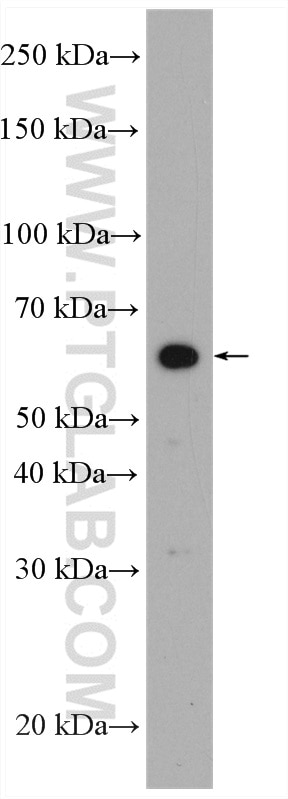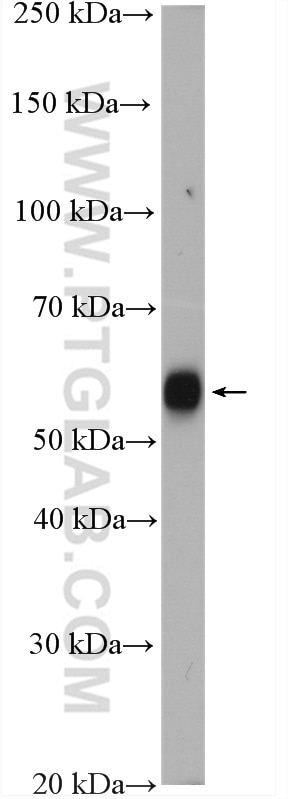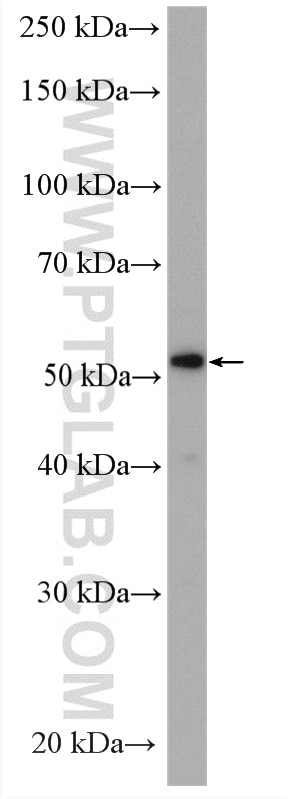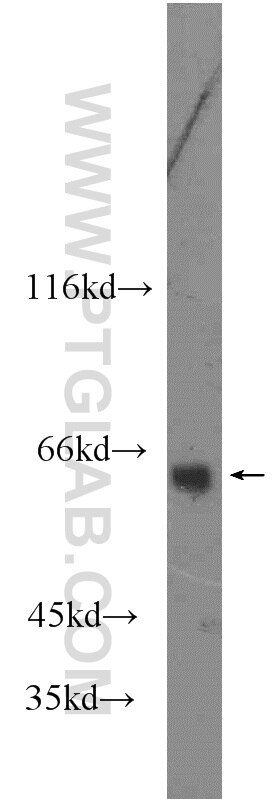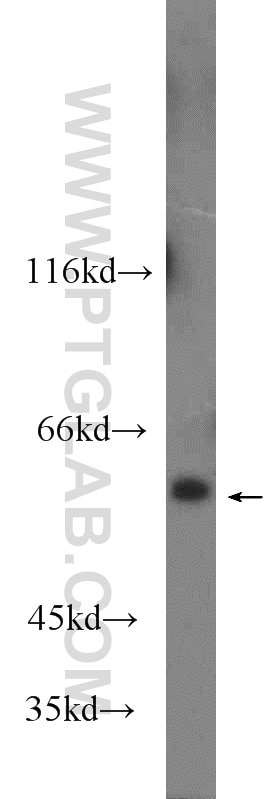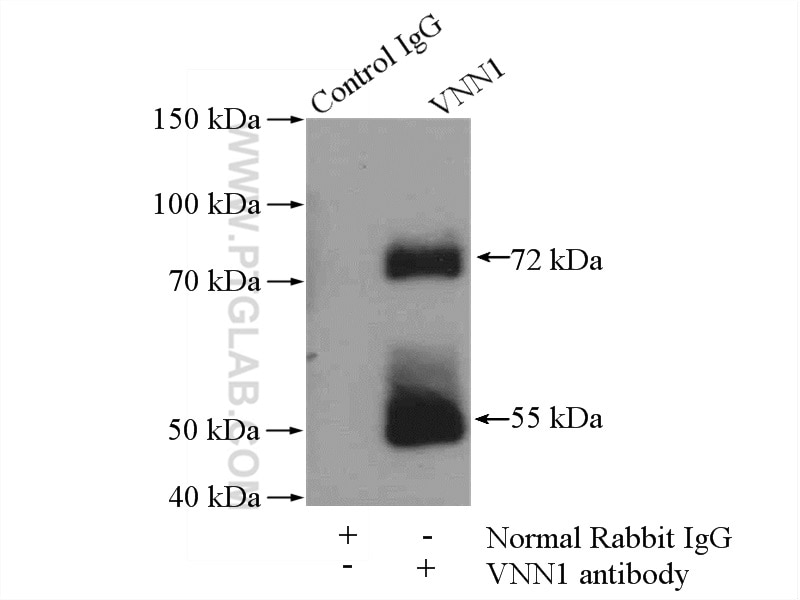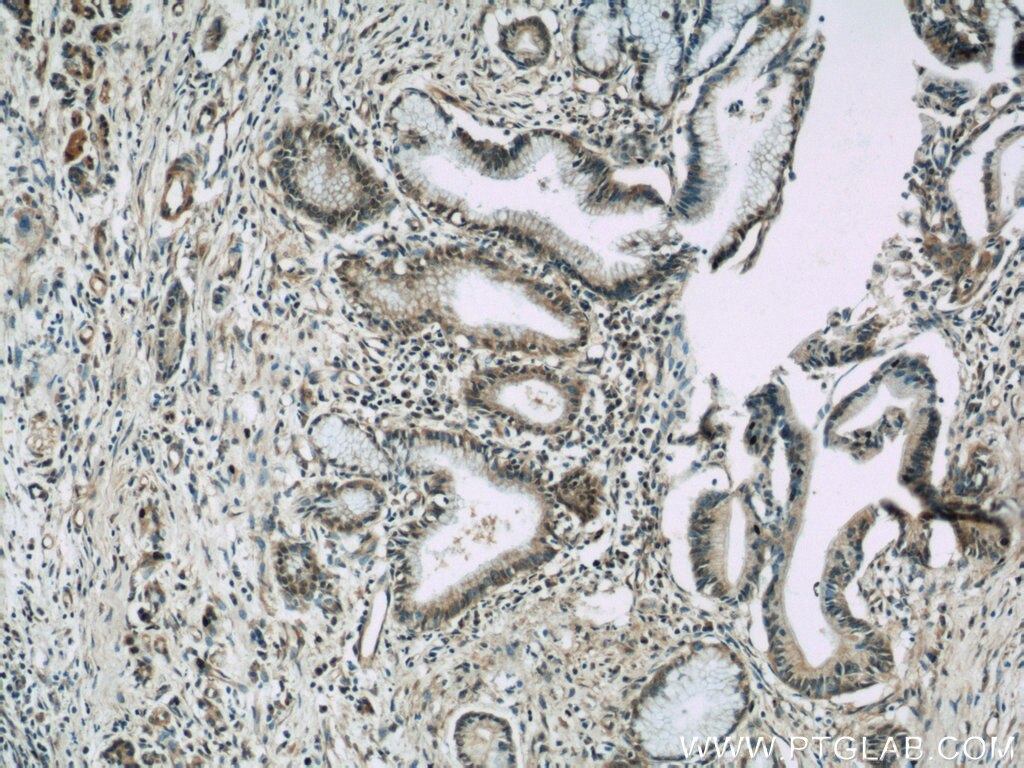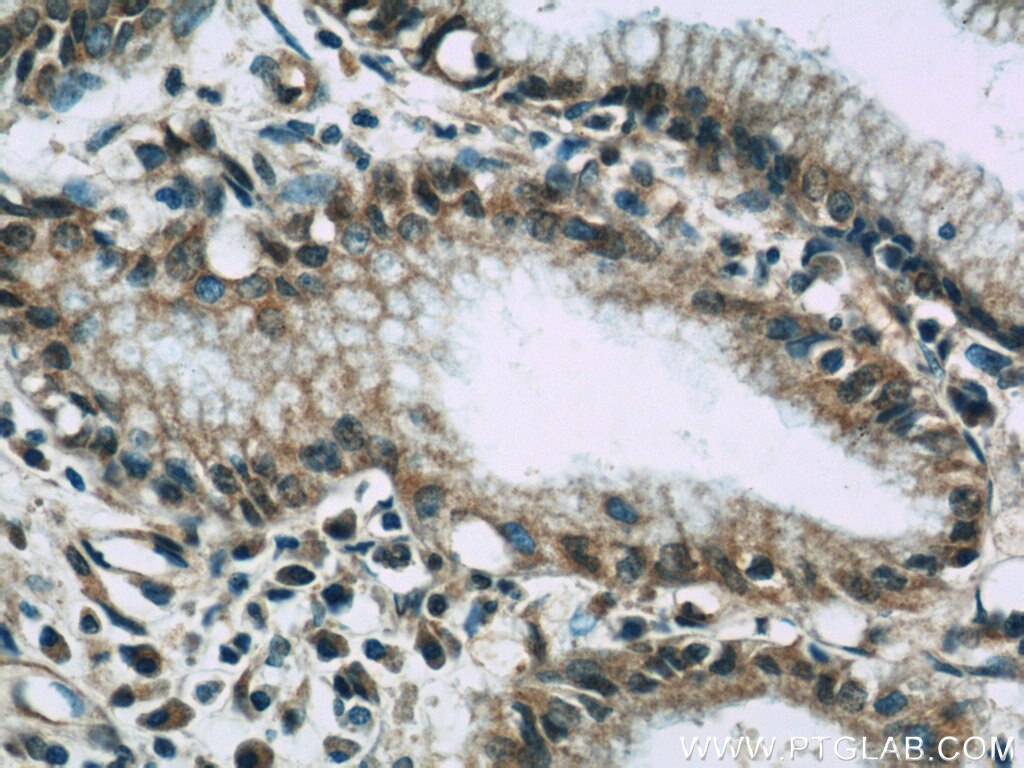- Featured Product
- KD/KO Validated
VNN1 Polyklonaler Antikörper
VNN1 Polyklonal Antikörper für IHC, IP, ELISA
Wirt / Isotyp
Kaninchen / IgG
Getestete Reaktivität
human, Maus
Anwendung
WB, IP, IHC, CoIP, ELISA
Konjugation
Unkonjugiert
Kat-Nr. : 21745-1-AP
Synonyme
Galerie der Validierungsdaten
Geprüfte Anwendungen
| Erfolgreiche IP | Mausnierengewebe |
| Erfolgreiche Detektion in IHC | humanes Pankreaskarzinomgewebe Hinweis: Antigendemaskierung mit TE-Puffer pH 9,0 empfohlen. (*) Wahlweise kann die Antigendemaskierung auch mit Citratpuffer pH 6,0 erfolgen. |
Empfohlene Verdünnung
| Anwendung | Verdünnung |
|---|---|
| Immunpräzipitation (IP) | IP : 0.5-4.0 ug for 1.0-3.0 mg of total protein lysate |
| Immunhistochemie (IHC) | IHC : 1:20-1:200 |
| It is recommended that this reagent should be titrated in each testing system to obtain optimal results. | |
| Sample-dependent, check data in validation data gallery | |
Veröffentlichte Anwendungen
| KD/KO | See 1 publications below |
| WB | See 8 publications below |
| IHC | See 1 publications below |
| CoIP | See 1 publications below |
Produktinformation
21745-1-AP bindet in WB, IP, IHC, CoIP, ELISA VNN1 und zeigt Reaktivität mit human, Maus
| Getestete Reaktivität | human, Maus |
| In Publikationen genannte Reaktivität | human, Maus |
| Wirt / Isotyp | Kaninchen / IgG |
| Klonalität | Polyklonal |
| Typ | Antikörper |
| Immunogen | VNN1 fusion protein Ag16501 |
| Vollständiger Name | vanin 1 |
| Berechnetes Molekulargewicht | 513 aa, 57 kDa |
| Beobachtetes Molekulargewicht | 55-72 kDa |
| GenBank-Zugangsnummer | BC096268 |
| Gene symbol | VNN1 |
| Gene ID (NCBI) | 8876 |
| Konjugation | Unkonjugiert |
| Form | Liquid |
| Reinigungsmethode | Antigen-Affinitätsreinigung |
| Lagerungspuffer | PBS mit 0.02% Natriumazid und 50% Glycerin pH 7.3. |
| Lagerungsbedingungen | Bei -20°C lagern. Nach dem Versand ein Jahr lang stabil Aliquotieren ist bei -20oC Lagerung nicht notwendig. 20ul Größen enthalten 0,1% BSA. |
Hintergrundinformationen
VNN1(Vascular non-inflammatory molecule 1) is also named as Vanin-1, Pantetheinase, Tiff66. It is a GPI-anchored 70-kDa protein with a high degree of homology with GPI-80 (also known as VNN2), a molecule expressed by human phagocytes and involved in leukocyte adhesion and migration. Vanin-1 is predominantly expressed by resident tissue cells and acts at the level of epithelial cells and surrounding hematopoietic cells by paracrine 2-Mercaptoethylamine release(PMID:17163446). The full length VNN1 has a signal peptide, a propeptide and six glycosylation sites. According to some authors, the variations which varied between 55 and 72kDa may be due to different degrees of glycosylation of the protein and cleavage (JOSE A et al. 2001).
Protokolle
| Produktspezifische Protokolle | |
|---|---|
| WB protocol for VNN1 antibody 21745-1-AP | Protokoll herunterladen |
| IHC protocol for VNN1 antibody 21745-1-AP | Protokoll herunterladen |
| IP protocol for VNN1 antibody 21745-1-AP | Protokoll herunterladen |
| Standard-Protokolle | |
|---|---|
| Klicken Sie hier, um unsere Standardprotokolle anzuzeigen |
Publikationen
| Species | Application | Title |
|---|---|---|
Theranostics Pancreatic ductal deletion of S100A9 alleviates acute pancreatitis by targeting VNN1-mediated ROS release to inhibit NLRP3 activation.
| ||
Sci Signal Lipid-Induced Toxicity Stimulates Hepatocytes to Release Angiogenic Microparticles That Require Vanin-1 for Uptake by Endothelial Cells. | ||
J Lipid Res VNN1 Promotes Atherosclerosis Progression in apoE Deficiency Mice Fed a High Fat High Cholesterol Diet. | ||
J Proteome Res Novel Elements of the Chondrocyte Stress Response Identified Using an in Vitro Model of Mouse Cartilage Degradation. | ||
PLoS One Circulating Extracellular Vesicles with Specific Proteome and Liver MicroRNAs Are Potential Biomarkers for Liver Injury in Experimental Fatty Liver Disease. |
